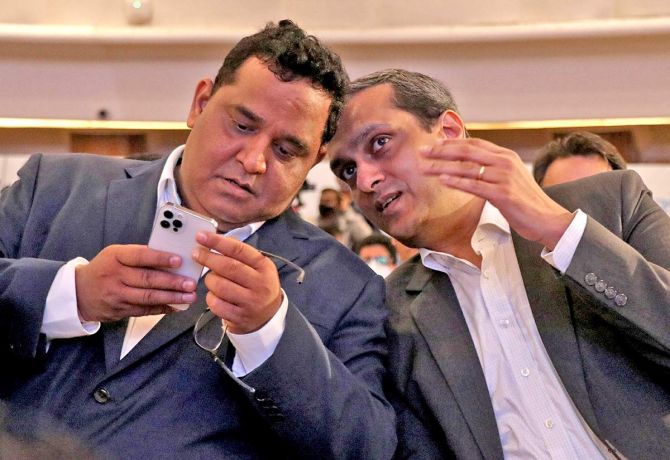'I can tell shareholders we're going to be very responsible with our capital, we're going to be absolutely execution focused.'

The country's largest initial public offering had a disastrous debut with the Paytm stock crashing 27 per cent.
"Maybe we need to do an even better job of trying to explain to a wide set of investors what Paytm's business model is, what makes it tick, what are the big opportunities in front of us, and also how they should measure whether we have been successful," Madhur Deora, president and group chief financial officer, Paytm, tells Business Standard's Samie Modak and Neha Alawadhi.
In hindsight, do you think the IPO's pricing could have been different?
A lot of people have a misunderstanding that a company prices its IPOs at whatever number it wants.
As recently as two weeks ago, investors were perfectly comfortable with the IPO price.
And that is why they invested in it. There are some of those investors, who may be buying or selling at different prices today.
That's completely outside the company's control.
Maybe only a few investors are bullish on the company. Otherwise, the stock wouldn't have crashed the way it did...
The point that you are making, that one or two investors might be bullish and the rest not, is factually untrue.
We had over 70 investors in our anchor round, and eight of them invested more in Paytm's IPO than they have in any other IPO in the history of our country.
It is hard for us to decipher one-day market movements.
What we can do is make sure that we go out in good faith, when we are announcing earnings, and talk about the way we are building our business.
What are the key learnings for you?
Some of these are learnings, while some are suggestions.
Firstly, our business model is very different from that of any other company in India.
When you get to the real specifics, maybe it's very different from most companies in the world.
Maybe we need to do an even better job of trying to explain to a wide set of investors what Paytm's business model is, what makes it tick, what are the big opportunities in front of us, and also how they should measure whether we have been successful.
The second thing that I can say as a message to shareholders is, we're going to be very responsible with our capital, we're going to be absolutely execution focused.
The two things that we are laser focused on are revenue growth and contribution profit.
So, in the June quarter, we delivered good growth.
We will announce our September results soon.
Investors can see how we're doing. Second is contribution profit, which is how much money we make after our payment gateway cost, cashbacks, direct costs.
That number in June was $33 million (Rs 245 crore), which is 3 times more on a year-on-year basis.
Paytm scale is commendable, but the message from the market is that you were too greedy with valuations...
Obviously, when you go and list, you hope for your price to go up rather than down.
It is hard to decipher precisely why it would go down.
It is also hard to take away from this what we could have done differently/
We got the bluest of blue-chip investors, who are long-term shareholders.
Maybe, we should have told our story even more, and more broadly, until people get sick of hearing us.
There is criticism that you've put your fingers in too many pies...
We are not a vertically-focused company. I don't think we're going to be a company that only does one thing.
But... and this is one of the things that we need to explain better, we are clearly a platform on which many services will exist.
It is very, very clear to us why we do what we do. Payments is clearly the engine.
And whatever the consumer or merchant wants to access on an app like ours, which can be digitally delivered to them.
Investors may not understand that framework, and that is our fault.
We need to communicate that better, to show discipline in sticking to that framework.
Do you think the payments industry will be able to monetise UPI payments going ahead?
It is hard to predict regulatory trends.
We have never told investors that they should expect anything like this.
Many of our customers come in through UPI and then start using other instruments like wallets, which makes us more revenue.
They also then move towards commercial financial services.
Why isn't there enough Indian representation on your board?
The board is not selected on the basis of nationality. We have a lot of people of Indian descent.
Feature Presentation: Aslam Hunani/Rediff.com












